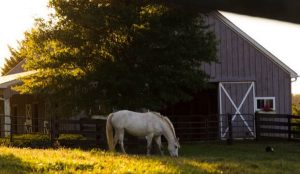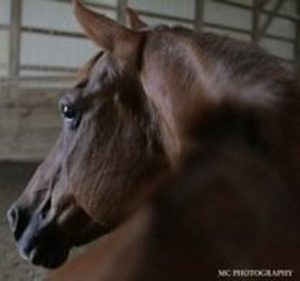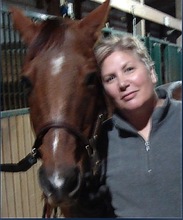Twelve Things to Consider When Deciding To Board Your Horse

It’s the first of the month, and you’re writing out a check to pay for your horse’s board. “Wouldn’t it be cheaper,” you wonder, “to just keep him here at home. I’ve got enough land for a paddock. And it would be so nice to just look out the window and see him out there. “Yes, boarding can be expensive. The average cost of boarding can range from $300 to over $1,000 a month, depending on where you live. But before you take the plunge to keep him at home, consider these twelve factors:
1. Horses need to be fed at least twice daily–every day. That doesn’t seem like a big deal. But it also means you’re locked in to a twice-daily routine, which plays havoc with vacation time or weekend visits with friends for family. There are two ways to manage this. First, check out the boarding facilities close to you to see if they can accommodate short term boarding requests. Second, see if you can arrange a reciprocal arrangement with a horse buddy–I’ll feed yours when you’re out of town if you’ll feed mine. It will bring you peace of mind knowing you have options. Otherwise, you can end up resenting your horse because you feel trapped by the demands of basic horse care.
The amount of hay and grain (feed concentrate) a horse needs depends on his age, breed, amount of daily activity, season, and many other factors. Do you know how much your horse needs?
2. What about water? Horses drink gallons of water daily. How are you going to get water to your horse? Horse troughs are easy ways to do that, but they need to be cleaned frequently because algae builds up in them easily. Cleaning a horse trough requires draining the remaining water, and scrubbing with bleach or other cleaning solution to remove the algae. An alternative is an automatic waterer. They must be plumbed in order to supply water when the horse drinks. These, too, must be cleaned frequently to prevent algae build up.
3. Where are you going to buy and store your hay and grain? If you don’t know much about to assess the quality of hay, you will need to buy it at a local feed store or other hay retailer, which can be expensive. If you’re knowledgeable, you may be able to buy directly from a hay farmer. When comparing prices, consider whether they will deliver and stack the hay for you. Do you plan to pick up and stack the hay yourself? If so, you’ll need a pickup truck that will accommodate a week or month’s worth of hay. Also consider that hay bales can weight anywhere from 50 lbs to over 100 lbs depending on the type of hay and how tightly the bales are bound. Do you know how to tell whether hay (or grain) is moldy or “off”? Also keep in mind that grain attracts rodents, so you will need an airtight storage container in which to keep it. If you just toss the 50 lbs bags in a corner of your property, expect to find rats, squirrels, chipmunks, and birds rooting around in the bags.
4. Remember that your horse’s stall or paddock will need to be cleaned DAILY. This is absolutely essential basic horse care. Letting manure pile up is not only a health hazard, it can cause problems with your neighbors. They won’appreciate the sight and smell of manure, or the flies manure attracts. That means you will be out there every day mucking out–rain, snow, or shine. One solution is to divide the mucking out chore between yourself and other people, such as spouse, teenaged children, or horsey friends who will reciprocate the favor. Many high schools have 4-H clubs whose teen members are responsible enough and eager enough to do farm work for reasonable pay or in exchange for the opportunity to ride your horse.
5. What are you going to do with all that manure? So you’ve mucked out your horse’s stall or paddock. Where are you going to put it? Thinking you can just make a manure pile? Re-read #2 above. Some options include taking it to your local county dump (they may charge you for this), have a farmer remove it (hog farmers have good use for manure), or find a tree nursery that would be interested in it. It makes fabulous fertilizer!
6. Do you have enough room for a 1,000-1,500 lb animal to move around in? Horses are grazing animals, and their digestion system works best when they can move about freely. One acre per horse is recommended by most veterinarians and equine professionals. If you keep him in a small paddock or stall except when you’re riding him, this could be a problem. He may have a lot of pent up energy and you might end up having to lunge him before his mind settles down to actually be ridable. And all that idleness can increase his risk of colic. If you think you have enough land to keep him in a pasture, consider this: Horses graze all of the time if they can. So your green pastures will turn into dry lots very quickly unless you can rotate your horse among two or more pastures. That means 2-3 acres that can be divided into separate grazing areas.

7. Horses are social animals, so they need friends. Can your property accommodate more than one horse? If not, one solution is to coordinate and rotate grazing areas with your horse buddies who are also keeping their horses at home. That not only gives pastures some time to recover but it will give your horse a social group to interact with. Horses are naturally social animals, and isolation can be hard on them. Turn out time with other horses is an essential part of basic horse care.
8. Do you have enough insurance? Keep in mind that a horse is often considered an “attractive nuisance” by county laws. If a child decides to jump over your fence to pet your horse and is injured in the process, you will be liable. If you decide to hire someone to muck out your horse’s stall or paddock, and that person is injured, you will be liable. Make sure your home insurance covers this contingency.
9. How much do you know about horse care and handling? Do you know how to take a horse’s vital signs (pulse, temperature, capillary refill rate, and respiration?) Do you know how to tell whether your horse is lame, and if so, which leg is the problem? Would you be able to tell if your horse were colicking, and would you know what to do? Would you know what to do if your horse injured himself? Do you know which vaccinations and de-wormers your horse receives, and when he needs to get them? Do you know how frequently your horse’s teeth need to be floated? Do you know what a Coggins test is, and when/whether you need to have one done annually? Do you know how horses’ feeding and care needs change as they age? If your horse got lose in the neighborhood, are you confident you could retrieve him safely on your own? If you have any doubt about these things, take the time to learn about basic horse care and basic horse veterinary care. Keep the phone number of a local vet in your phone contacts or prominently posted where you can find it in an emergency.
10. Will your farrier come to your property? Most farriers prefer to shoe horses at facilities that give them multiple horses to shoe, and have barns large enough so that they can drive their vehicle inside or at least right up to a sizable barn door. Check to make sure your farrier will come to your property. If not, then try to get on his shoeing list at a local hors boarding facility.
11. Do you have a horse trailer or access to a horse trailer? This is absolutely necessary for emergencies, veterinary procedures, or taking your horse to be shod if your farrier will not come to your property.
12. Do you know which plants, weeds, and trees are toxic to horses? Some of the most beautiful trees, shrubs, and plants are toxic to horses, such as black walnut, oleander, and chick weed.
With enough careful planning, you can keep your horse safely at home. You can find useful information about each of these issues here. If you do decide to board your horse, Petworks has hundreds of horse boarding and pet boarding services available throughout the United States. Book Now.
Happy riding!
Denise Cummins
The Thinking Equestrian
 Denise Cummins has over 30 years experience in training horses, showing them, giving riding instruction, and owning/running a successful equestrian boarding and training facility. She is also a research psychologist who has taught at the university level and continues to publish papers on human and animal learning and behavior. Her writings are backed up by scientific studies, veterinary expertise, and decades of experience in horse training and horse care.
Denise Cummins has over 30 years experience in training horses, showing them, giving riding instruction, and owning/running a successful equestrian boarding and training facility. She is also a research psychologist who has taught at the university level and continues to publish papers on human and animal learning and behavior. Her writings are backed up by scientific studies, veterinary expertise, and decades of experience in horse training and horse care.
